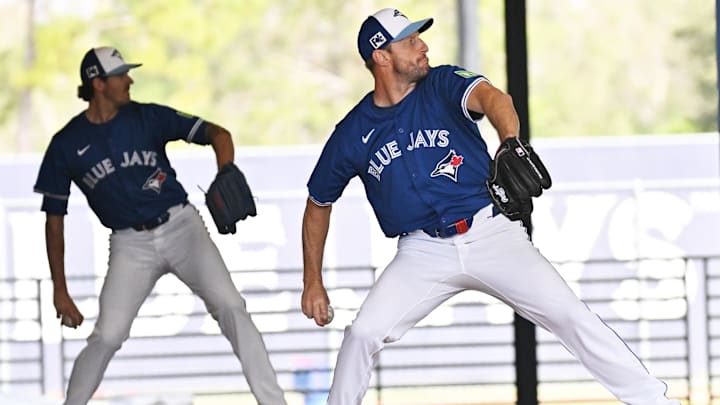The Toronto Blue Jays' signing of Max Scherzer was twofold.
The first part of the signing was his impact on the field. While Scherzer is 40-years-old, he's a future Hall of Famer who has won three Cy Young Awards and two World Series titles.
Even if he's nowhere near his peak, he's still an incredible competitor who can provide some much-needed depth to Toronto's rotation.
The second part of his signing is his impact off the field. As mentioned above, he's one of the most accomplished pitchers of his generation, and having him around will be nothing but a positive for the other pitchers on the Blue Jays' roster.
Max Scherzer provides insight into how he's mentoring younger Blue Jays
On Thursday, Scherzer went on MLB Network Radio and spoke on the topic of being a mentor to the younger arms in the Blue Jays' system, where he gave some surprising answers.
"I'm the old guy in the clubhouse. I'm forty years old now, so I've seen it all," Scherzer said. "But, no, just eyes and ears on things. I think everybody kind of wants grand sweeping changes, pitching philosophy, every secret you got.
"But I've done that before and it almost floods a young guy where you've got to be much more deliberate and just give kind of crumbs and just do one small thing at a time."
As Mad Max enters his 18th season, he is now a leader for young #BlueJays pitchers.
— MLB Network Radio on SiriusXM (@MLBNetworkRadio) March 6, 2025
Max Scherzer breaks down his thought process heading into each season:#SpringTrainingTour | @BlueJays
🔗 https://t.co/3lNMHjejQd pic.twitter.com/qL5usRT06T
That insight from Scherzer just reinforces why his signing was the perfect one for the Blue Jays. Not only did it verify the Blue Jays were planning on competing in 2024 (Scherzer said as much during his introduction), but it also added a grizzled and intelligent veterans for the other pitchers in the organization to lean on.
It makes sense that Scherzer wouldn't want to inundate some of the other pitchers with too much information since it could be the classic case of "too much of a good thing being a bad thing."
"It's really hard to add one small thing at a time each day," Scherzer said.
Pitchers (especially starting pitchers) are creatures of habit who have developed a system of success that's gotten them to MLB. But that doesn't mean that there's not room to improve or refine their mechanics, which is where Scherzer's input could come in.
We also learned that Scherzer doesn't take much from spring training results.
"I'm still getting to know each guy here because I don't take anything out of the results of spring training," he said. "We've got to get into the season."
Scherzer's right, it can be hard not to overreact to spring training stats (both positively and negatively). And while every player would prefer to start the spring strong, these comments are just another reminder that the month-long exhibitions schedule is about the process, not the results.
"Once you get into the season you've got scouting reports and the games count and everyone's firing," Scherzer said. "You know whether your slider's good or not; it's hard to judge it right now."
